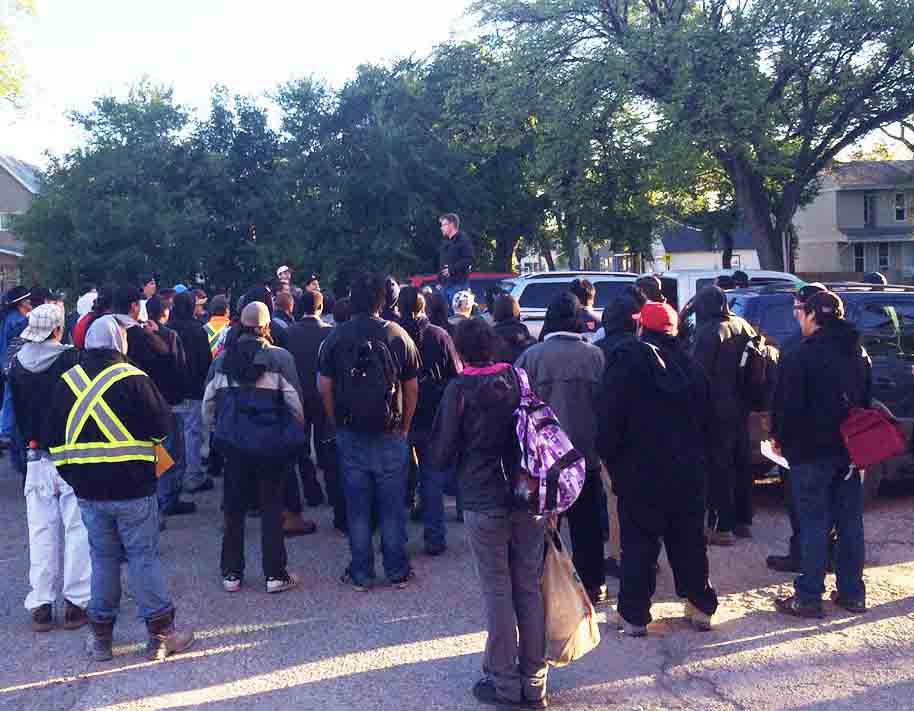Like this article? rabble is reader-supported journalism. Chip in to keep stories like these coming.
Are you willing to do physically demanding work for $12.50 -$13.50/hour, for a 1 month contract?
One hundred and four inner-city young men and women are. In fact, these men and women lined up before 8 a.m. in front of the North End Community Renewal Corporation to apply. As per the instructions in the job advertisement put out by Manitoba Green Retrofit (MGR), they had their steel-toed boots on and their resumes in hand.
MGR staff was blown away. They had expected maybe 30 applicants, but when so many showed up, they had to change the venue to the parking lot behind Merchants Corner to accommodate the large crowd.
There was another important piece of information in the advertisement: “Hiring 8 demolition workers to assist with preparations at the Merchants Hotel project.” So of the 104 hopefuls, only 8 will be lucky enough to land a job. But those odds didn’t deter people from waiting in line to hear more details and turn in their resumes.
Most of the job seekers were of Aboriginal descent. Lucas Stewart, General Manager at MGR, has been working with inner-city job seekers for years. The long line confirmed what he’s been saying for years: people — including those of Aboriginal descent — want to work.
Those of us who study labour market trends were also not surprised to see such a big crowd. Aboriginal employment participation rates in Manitoba’s urban centres range between 65 per cent in Winnipeg to 69 per cent in Thompson. Although lower than the non-Aboriginal rates (69 per cent and 82 per cent respectively), the statistics show that Aboriginal Manitobans are a vital component of the province’s labour market. The challenge is to increase the participation rate and close the income gap between Aboriginal and non-Aboriginal workers.
In Winnipeg, Aboriginal males earn $88 for every $100 earned by a non-Aboriginal man; for women the disparity is less at $91.32/$100. Meeting this challenge is even more important given the fact that Manitoba’s Aboriginal population is young and growing: the median age is 21 vs. 39 for the non-Aboriginal population. Manitoba’s Aboriginal population is projected to grow from 16 per cent of the total population to between 19 and 21 per cent by 2031. For this reason alone, providing training and job opportunities that meet the needs of Aboriginal people should be a public policy priority.
Social enterprises like MGR and BUILD (Building Urban Industry for Local Development) know that inner-city residents want to work, but they also understand the barriers preventing many from entering the workforce. These enterprises provide the necessary training and support to people who may have not finished their schooling, have had interaction with the criminal justice system, are dealing with addictions, are homeless, do not have official ID and who may never have had a job. MGR knows how to tailor the hiring process: no complicated forms to fill out; no hoops to jump through. Just wear your work boots, show up on time, and be willing to work hard.
BUILD and MGR give these people an opportunity to learn how to work, to experience the satisfaction of being self-sufficient and to feel proud of their accomplishments. It’s an opportunity that Stewart wishes he could offer to every one of the applicants. Being able to hire only 8 of the 104 who turned up in person is “heartbreaking.” Sara Atnikov, MGR’s office manager says, “the hardest thing about this is that everyone is so qualified and keen, but there aren’t enough jobs. So we have to go through 104 resumes and make really hard decisions.”
The staff at MGR and BUILD is frustrated: they don’t have enough work to meet the supply of inner-city workers who need that first break into the labour market, or access to job training. The province does partner with BUILD and MGR, but it could be providing more procurement work than it is. Furthermore, the province’s support has been dramatically hampered by the federal government’s new Canada Jobs Grant which directs resources away from programs that are specifically designed for multi-barriered workers. This federal policy redesign means the fewer inner-city workers will get the training and job opportunities they need.
If governments would recognize the advantages of partnering with social enterprises like MGR, more people would get the training and experience they need to meet Manitoba’s future labour market demands, while giving people an opportunity to realize their full potential.
Still don’t believe people want to work? Take another look at that crowd.
Lynne Fernandez holds the Errol Black Chair in Labour Issues at the Canadian Centre for Policy Alternatives, Manitoba.
Like this article? rabble is reader-supported journalism. Chip in to keep stories like these coming.



